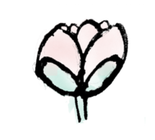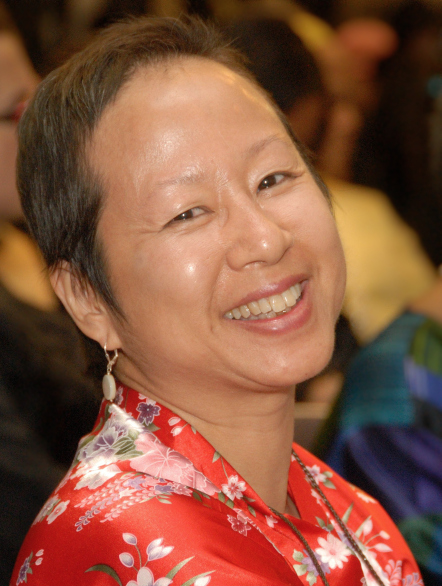
In 1975, at age 32, Mai Tran immigrated to the United States as a refugee from Vietnam. Without her parents, Mai arrived with her four younger siblings and her aunt’s family. Less than 48 hours in a refugee camp in Southern California, she was recruited by Chevron to work as a typist in San Francisco! In a day, Mai learned where to shop for groceries, do her laundry, and how to take the bus from Oakland to work.
“ . . . at the beginning, it was more emotional than getting ready. Because more or less, I went to French school since first grade and so, I know a little bit of the western civilization and all that, but emotionally speaking, is that I don’t have any friend, no classmates, no friends, no parents - that’s probably a bigger issue, but I am getting used to it very quickly because I am the older sister and have to take care of 4 siblings, try to find school for them, arrange for their bus, transportation, etc. and also try to get acquainted with the work because everything is completely new .. . the challenge is probably how to overcome all these emotional hurdle that I feel very difficult for me at that time because. .. we had no phone connection to Vietnam, there is nothing like the internet nowadays. And also the two countries have no diplomatic relations so I cannot even write to my parents."
Mai soon adapted to a routine of getting up at 5 a.m. , going to work, and to bed after cooking dinner and cleaning up. Unable to obtain her parent’s permission, she married a co-worker at Chevron whom she first met in Vietnam and then, saw again in a refugee camp. They had two daughters together, Christine and Bridget. After 24 years at Chevron, Mai was a data analyst and the family, having started in a rented apartment in Alameda County moved to their own home in Walnut Creek, California.
“I had mammogram every year, because Chevron very good in reminding their employees to go for checkup. As I remember well, I had mammogram in November 1998, try to schedule it around my birth month so I would remember every year. Everything was fine. In May 1999, the following year, Saturday morning, when I took a shower, then I found a lump in my left breast. I was stunned, how could that be. I found a small lump,less than one centimeter, less than ½ inch, but it was very hard, impression this is not right. It was Saturday so I could not call the doctor until Monday morning. So Monday, I called and I was with Kaiser at that time, gave me an appointment the week after the following Monday. 1999 already familiar with life in the U.S. I know how to advocate for myself, I told the person I need a doctor to look at my breast , need just two minutes to look at it. No more than two minutes, and I would like to have it today, Monday. I was able to see my doctor at the time, right in the afternoon. She touched and then she said, “let’s have a biopsy.” To me, what she said, this one short sentence, this is not something not right. She saw the expression on my face. She said 80% of lumps turn out to be benign so don’t worry.
Scheduled for me to come back for a lumpdectomy. What are you going to do? How do you do biopsy? I was told that it’s going to be cutting the lump, sending it to the lab, and results will be back in 48 hours and she’ll let me know. During that time, waiting for the two days for the results, hoping it would be benign, but unfortunately, the answer was not as expected. I got cancer.”
Mai’s husband had just returned from a three year assignment in Vietnam. After many sleepless nights, she finally shared her diagnosis with her husband via an email right before she was leaving for a business trip to Seattle. He saw the email and left nine messages at the place she was staying. Her two daughters were grown up by then, one just entering college, the other working in Austin. When Mai told them, they were shocked because they knew Mai exercised all her live and cooked almost all the meals at home.
Diagnosed with Stage 1 breast cancer, Mai had to decide between a “real lumpectomy” to get "clear margins" (remove more of her breast) or opt for a mastectomy. Not wanting to live with the fear that the cancer might come back, she chose a mastectomy. With the mastectomy, she did not have to undergo radiation. However, even though the lump was small, two lymph nodes were positive. So, she elected chemotherapy, as a participant in a clinical trial. Required to undergo chemo four times every three weeks, each time she would be administered two different drugs, adriamycin and taxitir, one after the other. After chemo, she would be on tamoxifen for five years. Many people in the family tried to talk her out of it. Since it was offered to her at the last stage of the clinical trial, Mai felt the initial stages must be good.
Diagnosed with Stage 1 breast cancer, Mai had to decide between a “real lumpectomy” to get "clear margins" (remove more of her breast) or opt for a mastectomy. Not wanting to live with the fear that the cancer might come back, she chose a mastectomy. With the mastectomy, she did not have to undergo radiation. However, even though the lump was small, two lymph nodes were positive. So, she elected chemotherapy, as a participant in a clinical trial. Required to undergo chemo four times every three weeks, each time she would be administered two different drugs, adriamycin and taxitir, one after the other. After chemo, she would be on tamoxifen for five years. Many people in the family tried to talk her out of it. Since it was offered to her at the last stage of the clinical trial, Mai felt the initial stages must be good.
“I was told not many known data about Asian women, I feel if I can do something that is the same time good for me and good for other people, I should try it. The risk, I think any treatment has some sort of risk there. I can’t say I get less risk if I choose standard treatment, or I have more risk if I choose clinical trial. It has a lot to do with positive thinking, my attitude, how I take care of myself physically and emotionally would be playing a big part in my well being . . .‘”
. . . if I compare myself as a country, if there are invaders, I should fight them. The more I fight, the more chance I can liberate my own country here. That’s also how I see things. Also, I have two girls. I want them to be able to think mom is strong and she is going to survive. Put less worry and pressure on my two girls and my three other sisters who are worried about getting breast cancer themselves because we are all siblings.”
After her diagnosis, Mai joined a support group in Walnut Creek, called the “Cancer Support Community”. Initially, her husband went to the primary care giver group and she to the patient group. Mai also signed up for the American Cancer Society’s Outreach Program which sent two breast cancer survivors, both Caucasian, to visit her. The treatment caused Mai to experience a lot of side effects, and once, she had to be hospitalized for a low white cell count. Because Christine’s employer allowed her to telecommute, Christine took a few months leave to be with Mai during her treatment. After a six month leave from Chevron, Mai attempted to go back to work part-time, but found herself very forgetful and exhausted. When her company offered her an early retirement package, she took it. Mai and her husband divorced eventually, he retired early and moved back to Vietnam by himself.
Initially, Mai volunteered for the Wellness Community and American Cancer Society and later, joined the Asian Pacific Islander National Cancer Survivor’s Network and connected with the Asian and Pacific Islander American Health Forum. In 2002, she established and continues to run the first bilingual cancer support groups in San Jose for the Vietnamese community. She feels the Asian culture teaches us to “share in the joys, but not in the sorrows. Asian patients need a place to learn how to open up and get help.”
Initially, Mai volunteered for the Wellness Community and American Cancer Society and later, joined the Asian Pacific Islander National Cancer Survivor’s Network and connected with the Asian and Pacific Islander American Health Forum. In 2002, she established and continues to run the first bilingual cancer support groups in San Jose for the Vietnamese community. She feels the Asian culture teaches us to “share in the joys, but not in the sorrows. Asian patients need a place to learn how to open up and get help.”
“I think first all, the feeling that you belong to a small group that went through the same experience I feel comfortable, I feel the comfort, and I feel the positive energy even though the person who came had just diagnosed and just went through first treatment. They cry, but you feel very comfortable. You don’t feel sorry for me, you don’t feel sorry for her. I have no ideal of that at all. I just feel comfortable, I feel good I am here for you, you are here with me. We can talk about this. Let’s face this problem together. If we don’t solve it, we can help each other, just giving each other emotional support. I do believe in positive support.”
And this positive support keeps her going. Mai’s home is filled with multiple projects in the works. Two gigantic pictures of her daughter hang on her living room wall. She enjoys swimming every day, watering her plants, spending time with her daughters, and being very civically engaged in the Vietnamese community.
